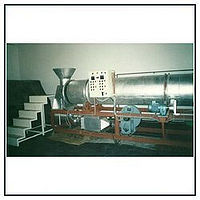Difference between revisions of "Rotary Dryers"
Jump to navigation
Jump to search
(Created page with "Category:Drying{{Knoppen}} <noinclude><!------------------------------------------------ * READ THIS FIRST * Only edit this page if you can improve the content. * Improp...") |
|||
| (4 intermediate revisions by one other user not shown) | |||
| Line 7: | Line 7: | ||
* Please start editing this page after the /noinclude | * Please start editing this page after the /noinclude | ||
* -------------------------------------------------></noinclude> | * -------------------------------------------------></noinclude> | ||
[[File:Rotary_Dryers.jpg|thumb|200px|right|Rotary Dryers]] | |||
The '''Rotary Dryers''' that are classified as direct or indirect (air heating method), current or counter current (material air contact). While using the dryers the material should be dried and uniformly dispersed over the entire cross-section. These dyers can also be customized based on the properties of the material. | |||
==Features== | |||
* Material is Passage through heated air | |||
* Dryer is driven through a girth gear and tyre arrangement | |||
* Minimum air leakage | |||
==Advantages== | |||
* Low operating costs | |||
* Low maintenance costs | |||
* Ideally suited for high volumes | |||
* High thermal efficiency | |||
==Materials== | |||
* Sand | |||
* Clays | |||
* Maize germs | |||
* Coal | |||
* Ore | |||
* Industrial sludge | |||
Latest revision as of 18:41, 1 August 2012
The Rotary Dryers that are classified as direct or indirect (air heating method), current or counter current (material air contact). While using the dryers the material should be dried and uniformly dispersed over the entire cross-section. These dyers can also be customized based on the properties of the material.
Features
- Material is Passage through heated air
- Dryer is driven through a girth gear and tyre arrangement
- Minimum air leakage
Advantages
- Low operating costs
- Low maintenance costs
- Ideally suited for high volumes
- High thermal efficiency
Materials
- Sand
- Clays
- Maize germs
- Coal
- Ore
- Industrial sludge
